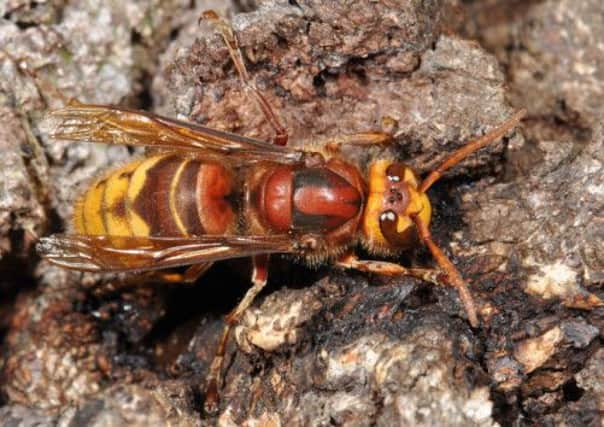Story of an undeserved reputation with a sting in the tail


This year, the first reports of a wasp invasion came a little later than normal, but all the usual details were there.
Tales of mass swarms inflicting misery on an unsuspecting public are now as familiar as forecasts of barbecue summers and sure enough, a week or so ago we were warned to brace ourselves for an unseasonal attack.
Advertisement
Hide AdAdvertisement
Hide AdThe late arrival of this particular plague was blamed on the perfect storm of the cold winter and late spring. The former allowed wasps to hibernate for longer, while the latter has led to a bumper fruit harvest and abundant food supplies.
By way of proof, some pointed to the story of a seven-year-old cocker spaniel called Betty, who went into anaphylactic shock after being stung more than 130 times. The dog survived, but if family pets cheating death wasn’t enough, there was anecdotal evidence of outdoor events being disrupted by uninvited guests.
So have wasps really marshalled themselves into an aggressive army bent on revenge for the bad press they’ve received over the years? Well, not quite. It turns out it’s all a question of perception.
Stuart Roberts chairman of the Bees Wasps and Ants Recording Society (BWARS) explains: “The public should rest assured that there is no plague of wasps this year, but certainly there are quite a few of them around.
Advertisement
Hide AdAdvertisement
Hide Ad“In fact 2013 is looking like an average to slightly above average year for the UK’s social wasps. There is a perception that there is a larger number around but that is simply because the last three or four years have been cold and wet and as a consequence, absolutely awful for wasps with far fewer present than during an average year.
“Earlier this summer I was actually getting calls from people asking why there were so few wasps on the wing. Like a lot of other insect life the cold winter coupled with the delayed spring meant that they appeared around three weeks later than usual.
“Cold winters generally mean hibernation is more successful. In fact the worst thing a wasp queen can have is a warm winter because they fidget an use up the food reserves and I suspect this has an effect on mortality.
“Honestly, if you looked at 30-year picture, this year is on a par with average.”
Advertisement
Hide AdAdvertisement
Hide AdLate summer and early autumn is the peak season for wasps as their colonies build in numbers, but the first frosts in October or November should see their numbers reduced almost overnight.
While Roberts may be appealing for calm, Rentokil has set up UKWaspWatch, where users can tweet their postcode under the hashtag #UKWaspWatch and report when they spot wasps, are stung, or discover a nest.
Tweets are automatically marked on a live map of the UK, building a picture of where wasps are most prevalent. The most recent live updates on the map show that Sheffield is currently Yorkshire’s biggest wasp hotspot, followed closely by Hull.
When Rentokil launched the site a couple of years ago, the company said the information was useful in logging population movements and identifying possible problem areas. However, Roberts is not convinced, saying the initiative only serves to represent a map of “people’s intolerance to wasps”.
Advertisement
Hide AdAdvertisement
Hide AdThe species is certainly resilient. While other insects like butterflies and moths have suffered alarming declines in recent years, in the UK wasps are bucking the trend. In the last 30 years our native wasps have been joined by two new colonists – the Median wasp and the Saxon wasp from the Continent, while hornets, the striking and oversized version of the social wasp have also experienced an increase in numbers.
“The trick is not to panic,” says Roberts. “If a wasp does land on you wait for it to fly off or brush it with a piece of paper – not your hand. Try not to squish them as the dying wasp will release alarm pheromones that will attract others. Wasps are attracted to food smells so keep your bins tidy and food waste covered and remember to close windows and doors during food preparation.”
It may be a hard job to convince the UK public to change their views on wasps, but Roberts is a man on something of a mission to raise awareness of the integral ecological role they play as pollinators and as recyclers of nutrients through their scavenging habits.
He adds: “People should try and think again about wasps as they do a fantastic job in pest control – they get rid of caterpillars, fly larvae, aphids and lots of unpleasant garden pests – they are the top insect predator in their environment.”